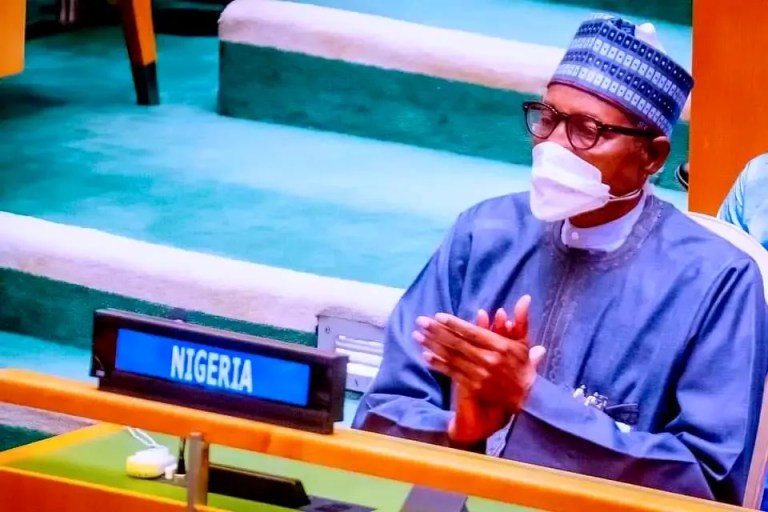President Muhammadu Buhari has assured participants at the 2nd Intra-African Trade Fair 2021, that his delegation is attending with ‘‘full force’’ to maximize the advantage of the gathering.
Malam Garba Shehu, the president’s media aide, said in a statement in Abuja, that Buhari stated this while addressing the opening ceremony of the event in Durban, South Africa, on Monday.
The President said: ‘‘Let me assure you that Nigeria has come to Durban in full force to actively participate in this very important trade fair and take full advantage of all the opportunities it will provide.
‘‘We have streamlined the country’s participation under one roof to enable you access all the information you need.”
He expressed optimism that the creation of the biggest free trade area in the world, the African Continental Free Trade Area (AfCFTA), would work, especially with the active collaboration of the public and private sectors.
The president canvassed support for the implementation of the free trade initiative, listing several benefits to the continent, including doubling trade in 10 years and reducing over-reliance on imports.
The Nigerian leader expressed concern that most of Africa’s existing challenges, whether security, economy, or corruption, could be traced to the inability over the years to domesticate the production of most basic requirements and provide jobs to her teeming and dynamic youth population.
‘‘Under the African Continental Free Trade Area, we can double our intra-African trade by 2030, reduce our reliance on imports and therefore create more jobs within the continent.
‘‘We cannot achieve this goal by talking alone. The implementation will be a difficult journey. But all challenges are surmountable if both the public and private sectors collaborate.
‘‘On the public sector side, Governments must support local entrepreneurs to build scale and therefore improve productivity.
‘‘This means providing incentives to encourage our businesses to formalise and comply with laid down regulations,’’ he said.
On the rules of engagement for the free trade initiative, President Buhari reminded fellow Heads of State and participants at the trade fair, that:
‘‘Free trade must also be fair and fairness can only be achieved when there is full compliance with regulations, especially those relating to rules of origin.
‘‘The AfCFTA is for ‘made-in-Africa’ products and services.
‘‘Africa must be a marketplace where no country is left behind. As we implement, we must ensure that we create jobs and enhance revenues for all parties.
‘‘We must leverage on one another’s strengths to succeed.”
He also called on businesses in Africa to key into existing regional value chains or build new ones, either to extend operations into the higher value segments of their industries or to satisfy the Area’s rules of origin requirements.
The Nigerian leader expressed delight that the Intra-African Trade Fair is uniquely positioned to help in these areas.
The President stressed that the Nigerian economy under his administration had witnessed a re-engineering.
‘‘As many of you are aware, in the past five years, Nigeria has made significant strides towards the diversification of her economy from an oil revenue-dependent country to a nation with diverse revenue sources.
‘‘We were able to achieve this by putting in place fiscal, monetary and trade policies that support investments and investors in key sectors such as agriculture, mining, telecommunications and digital economy, banking and financial services, tourism, and manufacturing,’’ he said.
While declaring that Nigeria is open for business, the President highlighted that progress is being made in the reforms of key institutions, the fight against corruption as well as the ease of doing business in the country.
He congratulated the African Union Commission, the AfCFTA Secretariat and the Africa Export-Import Bank for their dedication and relentless effort in seeing the Trade Area become a reality.
‘‘Today is a great day for Africa as we start our collaborative journey towards collective economic prosperity through the African Continental Free Trade Area.
”I very much look forward to seeing more African products manufactured in Africa using African resources.
‘‘I also commend the people of Durban for hosting this year’s Intra-African Trade Fair. I sincerely hope that we will witness milestone agreements among African businesses at this gathering.
‘‘Through these gatherings, we will be laying a solid foundation for future business-to-business, business and government, and government-to-government co-operation,’’ he said.
President Buhari’s expectation of a good performance by Nigerian businesses at the Durban Fair is hinged on the outcome of the last edition in Cairo, Egypt, at which they got deals worth over US$ 3.3 billion.
Current records show that Intra African trade accounts for only 15 per cent of their transactions.
(NAN)



